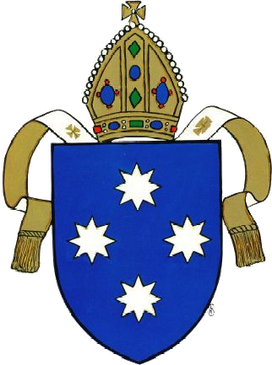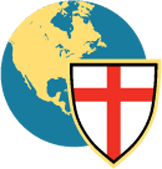
The Anglican Communion is the third largest Christian communion after the Roman Catholic and Eastern Orthodox churches. Founded in 1867 in London, the communion has more than 85 million members within the Church of England and other autocephalous national and regional churches in full communion. The traditional origins of Anglican doctrine are summarised in the Thirty-nine Articles (1571). The archbishop of Canterbury in England acts as a focus of unity, recognised as primus inter pares, but does not exercise authority in Anglican provinces outside of the Church of England. Most, but not all, member churches of the communion are the historic national or regional Anglican churches.
Anglicanism is a Western Christian tradition which developed from the practices, liturgy, and identity of the Church of England following the English Reformation, in the context of the Protestant Reformation in Europe. It is one of the largest branches of Christianity, with around 110 million adherents worldwide as of 2001.

The Nippon Sei Ko Kai, abbreviated as NSKK, sometimes referred to in English as the Anglican Episcopal Church in Japan, is the national Christian church representing the Province of Japan within the Anglican Communion.
The Continuing Anglican movement, also known as the Anglican Continuum, encompasses a number of Christian churches, principally based in North America, that have an Anglican identity and tradition but are not part of the Anglican Communion.

The Diocese of Sydney is a diocese in Sydney, within the Province of New South Wales of the Anglican Church of Australia. The majority of the diocese is evangelical and low church in tradition.

The Anglican Church of Canada is the province of the Anglican Communion in Canada. The official French-language name is l'Église anglicane du Canada. In 2022, the Anglican Church counted 294,931 members on parish rolls in 1,978 congregations, organized into 1,498 parishes. The 2021 Canadian census counted 1,134,315 self-identified Anglicans, making the Anglican Church the third-largest Canadian church after the Catholic Church and the United Church of Canada.
The Anglican Church of Southern Africa, known until 2006 as the Church of the Province of Southern Africa, is the province of the Anglican Communion in the southern part of Africa. The church has twenty-five dioceses, of which twenty-one are located in South Africa, and one each in Eswatini, Lesotho, Namibia and Saint Helena. In South Africa, there are between 3 and 4 million Anglicans out of an estimated population of 45 million.

The Church of Bangladesh is a united Protestant church formed by the union of various Protestant churches in Bangladesh, principally the Anglican and Presbyterian denominations. The Church of Bangladesh is full communion with the Anglican Communion. Also it's a member of World Communion of Reformed Churches.
The Traditional Anglican Church (TAC), formerly the Traditional Anglican Communion, is an international church consisting of national provinces in the continuing Anglican movement, independent of the Anglican Communion and the Archbishop of Canterbury. The TAC upholds the theological doctrines of the Affirmation of St. Louis. Each of the respective jurisdictions utilizes a traditional Book of Common Prayer deemed to be free of theological deviation. Most parishioners of these churches would be described as being traditional Prayer Book Anglicans in their theology and liturgical practice. Some Anglo-Catholic parishes use the Anglican Missal in their liturgies. The TAC is governed by a college of bishops from across the church and headed by an elected primate.

The Anglican Catholic Church (ACC), also known as the Anglican Catholic Church (Original Province), is a body of Christians in the continuing Anglican movement, which is separate from the Anglican Communion. This denomination is separate from the Anglican Catholic Church in Australia and the Anglican Catholic Church of Canada.

Michael Geoffrey Peers was a Canadian Anglican bishop who served as Primate of the Anglican Church of Canada from 1986 to 2004.

The Anglican Province of America (APA) is a Continuing Anglican church in the United States. The church was founded by former members of the Episcopal Church in the United States.

The Anglican Church of South America is the ecclesiastical province of the Anglican Communion that covers six dioceses in the countries of Argentina, Bolivia, Paraguay, Peru, and Uruguay.
The September 14–16, 1977 Congress of St. Louis was an international gathering of nearly 2,000 Anglicans in St. Louis, Missouri, united in their rejection of theological changes introduced by the Anglican Church of Canada and by the Episcopal Church in the United States of America in its General Convention of 1976. Anglicans who attended this congress felt that these changes amounted to foundational alterations in the American and Canadian provinces of the Anglican Communion and meant that they had "departed from Christ's One, Holy, Catholic and Apostolic Church." Theological liberalism, financial support for political action groups, participation in the Consultation on Church Union (COCU), revisions to the Book of Common Prayer, and the ordination of women priests were not the only reasons for the split, but they were seen by these churches as evidence of the mainline church's departure from Anglican orthodoxy. The idea for a congress originated with the Reverend Canon Albert J. duBois in 1973 in preparation for the Louisville General Convention of the Episcopal Church. Canon duBois and the group called "Anglicans United" toured parishes in advance of the Congress to garner support. This congress was sponsored by the Fellowship of Concerned Churchmen, an organization founded in 1973 as a coordinating agent for laypeople and clergy concerned about the breakdown of faith and order within the Episcopal Church and the Anglican Church of Canada.

The General Synod of the Anglican Church of Canada is the chief governing and legislative body of the Anglican Church of Canada (ACC), the sole Canadian representative of the Anglican Communion. The first General Synod session was held in Toronto in 1893, with the proviso that the parameters of its authority would not undermine the local independence of dioceses.

The Anglican Church in North America (ACNA) is a Christian denomination in the Anglican tradition in the United States and Canada. It also includes ten congregations in Mexico, two mission churches in Guatemala, and a missionary diocese in Cuba. Headquartered in Ambridge, Pennsylvania, the church reported 977 congregations and 124,999 members in 2022. The first archbishop of the ACNA was Robert Duncan, who was succeeded by Foley Beach in 2014.
The Bartonville Agreement came from a meeting held in May 1999 by bishops representing both the Anglican Communion's American province and a number of Continuing Anglican jurisdictions in North America. As such, it was an early effort made by conservative Episcopal bishops and Continuing Anglican bishops to voice a common set of principles which might become the basis of future cooperation between their churches or dioceses. The schism that had divided these church bodies had occurred in 1977 at the Congress of St. Louis when "Continuers" met and formed a new Anglican church in reaction to changes in doctrine and practice that had been approved by the Episcopal Church and the Anglican Church of Canada.
The Anglican Church of Canada is the third largest church in Canada, after the Roman Catholic Church and the United Church of Canada. After many years of debate, the first blessing of a same-sex partnership took place in 2003, by the Diocese of New Westminster, in Vancouver. This was not considered a marriage ceremony, but rather a blessing of "permanent and faithful commitments" between persons of the same sex.

The 1962 Book of Common Prayer is an authorized liturgical book of the Canada-based Anglican Church of Canada. The 1962 prayer book is often also considered the 1959 prayer book, in reference to the year the revision was first approved for an "indefinite period" of use beginning in 1960. The 1962 edition follows from the same tradition of other versions of the Book of Common Prayer used by the churches within the Anglican Communion and Anglicanism generally. It contains both the Eucharistic liturgy and Daily Office, as well as additional public liturgies and personal devotions. The second major revision of the Book of Common Prayer of the Anglican Church of Canada, the 1962 Book of Common Prayer succeeded the 1918 edition, which itself had replaced the Church of England's 1662 prayer book. While supplanted by the 1985 Book of Alternative Services as the Anglican Church of Canada's primary Sunday service book, the 1962 prayer book continues to see usage.











